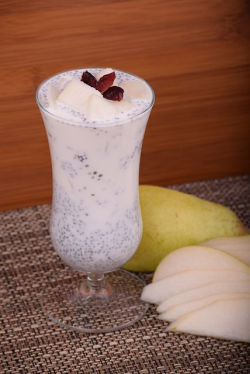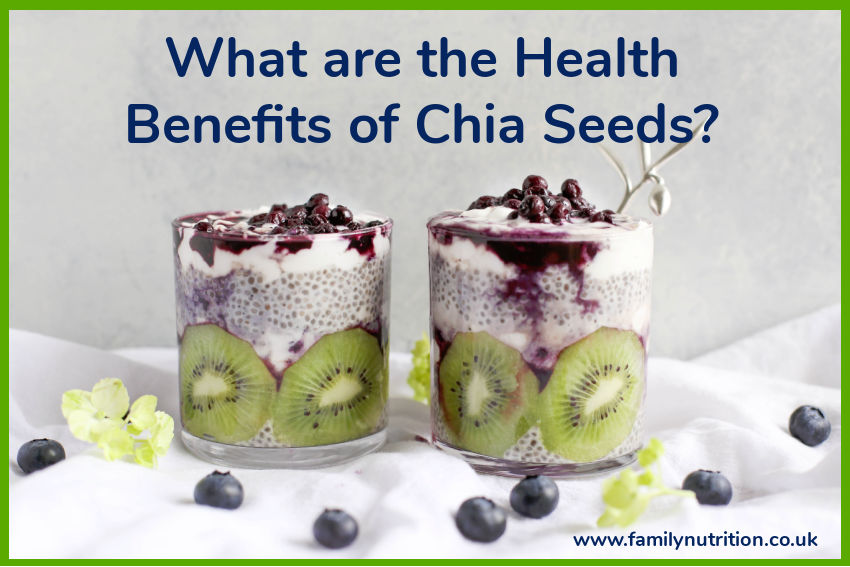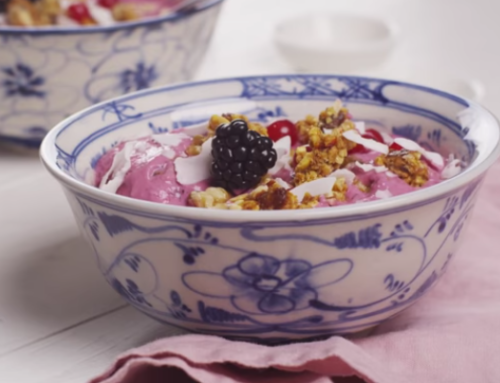Chia seeds are classed as a “superfood” that has been slowly growing in popularity since the 1980’s. With an impressive array of nutrients, these tiny seeds are filled with potential health benefits.
Whether you’re looking to regulate your metabolism, reduce risk of stroke and heart disease, or improve digestion and skin condition, eating chia seeds may hold the key to better health.
What are Chia Seeds?
Chia seeds are small, nutrient-dense seeds that come from the flowering plant salvia hispanica, a member of the mint family, native to Central and South America.
As vegetarian and vegan lifestyles started to become popular in the early 2000’s, they started to take the nutrition world by storm, being recognised by dieticians and nutritionalists as a good source for plant based protein.
The unique texture of the seed makes it easily digestible and is often used as an ingredient in recipes for breakfast bowls, smoothies, baked goods, salads and more. Additionally, ground chia seeds or chia gel can be used as an egg substitute in vegan recipes or to thicken sauces and dressings.
The Nutritional Value of Chia Seeds
Chia seeds are an excellent source of nutrition, containing a wide range of essential vitamins and minerals.
This vegan superfood is abundant in:
- fibre
- protein
- healthy fatty acids like omega-3
- antioxidants
- plant sterols.
Additionally, they contain a significant amount of calcium and magnesium – two important minerals that play a role in maintaining good teeth and bone health.
As the body cannot produce calcium on its own and has to be obtained through diet, a single teaspoon of chia seeds can go a long way, supplying approx 20% of your recommended daily intake.
Furthermore, they are relatively low in fat and natural sugar when compared to other health foods and can be added to all sorts of meals for an extra boost in flavor and nutrients.
How Chia Seeds Can Help with Weight Loss and Metabolism Regulation
Chia seeds are high in fibre and protein, which work together to promote weight loss and regulate metabolism.
Fibre helps to keep you full for longer, resulting in less snacking or overeating and also binds to toxins, helping to rid the body of any built-up waste.
Protein, on the other hand, helps your body repair and grow muscle, aiding in fat burning and maintaining a healthy weight.
Additionally, chia seeds contain a large amount of omega-3 fatty acids, which have been proven to reduce inflammation caused by obesity and improve metabolism.
Finally, they are very low in calories compared to other grains and nuts, so adding them into your diet can still provide many health benefits without the added calories that come with other food sources.
All these factors combined make eating chia seeds quite an ideal choice for those looking to lose weight or regulate their metabolism, while still getting all the nutrients they need!
Is it OK to eat chia seeds everyday?
It is generally safe to eat chia seeds everyday. The recommended daily intake of dried chia seeds is between 1-2 tablespoons, though you can adjust this depending on your individual needs and goals.
Please note however, that eating too many chia seeds can cause gastrointestinal issues such as bloating or constipation. So start slowly and adjust the daily quantity according to your body’s reaction. Also, make sure you either soak them in water &/or consume enough water alongside to reduce the chances of any negative side effects.
Chia Seed and Heart Health
In addition to the potential weight loss benefits, consuming chia seeds has also been linked to several heart health benefits.
The high levels of omega-3 fatty acids, fibre, and protein contained in chia seeds all work together to help keep cholesterol levels low, reduce the risk of stroke, and help with overall cardiovascular health.
Studies have shown that the omega-3 fatty acids in chia can help reduce inflammation and lower bad cholesterol levels which are both linked to high blood pressure.
The soluble fibre found in chia helps bind to bile acids which can help reduce high triglyceride levels, another factor connected with hypertension.
Chia seeds also contain antioxidant compounds that can reduce damage done by free radicals in the body. Additionally, they are a great source of fiber which helps to flush out toxins and excess cholesterol from the body.
All these factors combine to make Chia an ideal choice for maintaining a healthy heart
Other Health Benefits of Chia Seeds
Blood sugar regulation
Chia seeds can be an excellent way to help regulate blood sugar levels. The high fibre content in the seed binds with sugar molecules and helps slow down its absorption in the bloodstream. This reduces the amount of sugar that is available for energy which can help prevent blood sugar spikes.
Digestion and gut health
Chia seeds are a great aid to digestion. Their high fibre content helps to bind with toxins and waste materials, helping them move through the digestive system more quickly. This can reduce the risk of constipation and other digestive discomfort.
Additionally, using whole chia seeds has been shown to help stimulate the growth of healthy probiotic bacteria in the gut, leading to improved nutrient absorption and better overall digestive health.
Chia also helps keep you feeling full for longer which can prevent overeating and its associated digestion problems. Consuming these nutritious seeds regularly is a great way to maintain regularity and support your overall digestive health.
Support healthy skin and hair
Chia seeds are packed with essential vitamins and minerals that help support healthy skin and hair. Their antioxidant properties boost collagen production and protect against free radical damage, while their anti-inflammatory compounds help reduce inflammation in the skin.
Provides a ‘complete’ vegan protein
Chia seeds are well known for being a complete vegan protein source, meaning that they contain all the essential amino acids needed for muscle growth and repair. This makes them an ideal choice for anyone looking to get more plant-based protein in their diet – especially for vegans and vegetarians.
Aside from its complete protein content, chia also contains high levels of dietary fiber, and omega-3s, making it a great source of energy throughout the day.
Chia Seed Recipe Examples
Here are a few recipes to get your taste buds tingling:
- Chia Seed Pudding – Combine 2 parts almond or coconut milk with 1 part chia seeds, as well as sweetener and/or spices (e.g., nutmeg, cinnamon or vanilla) to taste. Allow the mixture to sit for 10-15 minutes or until thickened.
- Chia Protein Bars – Blend together nuts (e.g., almonds, walnuts), dates, dry chia seeds and ground flax seeds into a coarse meal. Shape into bars and set in the refrigerator until firm.
- Chia Jam – Mash any desired fruit until it forms a thick paste and stir in some dry chia seeds before simmering over low heat and stirring frequently until thickened.
- Smoothie Bowl – Blend together yogurt, banana and berries with liquid of choice before stirring in chia seeds on top and sprinkling over your favorite toppings (e.g. fresh fruit, nuts, cinnamon).

In Summary
Chia seeds can be a great addition to your daily diet; offering multiple health benefits without the added calories that come with other food sources. So pop a packet in your shopping basket next time you do your weekly or monthly shop and try out a recipe or two!






Leave A Comment